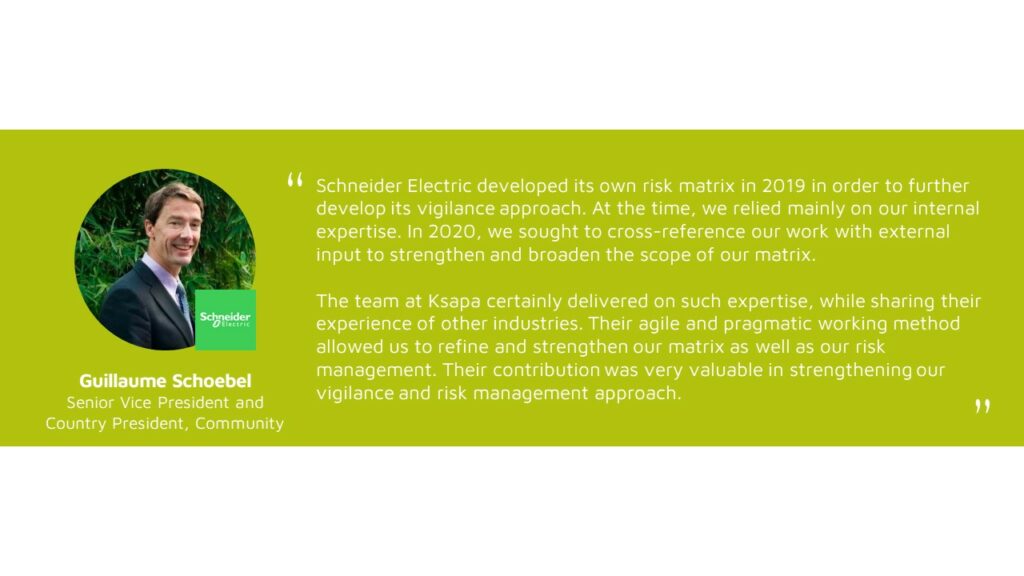Goals
Ksapa and Schneider Electric worked together to strengthen the Group’s risk assessment as per its Duty of Vigilance. The goal was for the Group to further assess key topics, thereby improving the relevance of its risk matrix.
Based on a risk matrix initially developed by Schneider Electric in 2019, Ksapa conducted an in-depth review. Our approach was indeed structured around two guiding principles:
- Ksapa focused on refining the existing Schneider Electric Duty of Vigilance matrix. This involved finetuning the Group’s risk assessments as well as the definitions attached to them.
- We likewise strengthened the Group’s risk analysis with regard to its Duty of Vigilance. This covers local communities, Group sites and locations as well as wherever Schneider Electric solutions are implemented for customers.
How did we proceed: Strengthening Group Risk Assessment Under The Duty Of Vigilance
Ksapa structured an extensive review of Schneider Electric’s risks. This way, we streamlined understanding of the Duty of Vigilance. Here is how we ultimately secured their integration into the Group’s strategic and operational universe:
1. Ksapa’s In-House Duty of Vigilance Risk Assessment Methodology
Ksapa mobilized an in-house methodology to assess risks linked to the Duty of Vigilance. This notably includes environmental, digital, health and safety issues. This way, we outlined a set of concrete issues for Schneider Electric experts to position themselves as to the probability of each risk in their operational realities.
From there, they could assess the relevance of their risk mitigation tools (policies, operating procedures, internal expertise, governance).
2. A Diverse Set of Expertise
Ksapa delivered its contribution through a tightly-knit team based between Paris and San Francisco. Beyond our Duty of Vigilance expertise, we also shared our outlook on industrial approaches and challenges in environments similar to those of Schneider Electric, its subcontractors or customers.
To confirm our working hypotheses, we mobilized targeted Ksapa affiliate resources to reflect strategic geographies for Schneider Electric (India, China, Indonesia…).
3. Active Engagement for Internal Alignment
Ksapa conducted interviews with a variety of Duty of Vigilance experts and decision-makers across Europe, the United States and Asia. That is how we documented the operational realities of Schneider Electric teams. We indeed covered the way they work with customers, across the supply chain and in managing its sites and employees.
We also organized regular check-ins with the Group project team to refine our analyses and integrate further input. This process contributed to identifying issues under the Duty of Vigilance law. We then translated them in the most concrete and relevant manner possible within the Schneider Electric universe. We eventually facilitated their appropriation and contributed to reinforcing internal alignment around Duty of Vigilance issues.
Ksapa’s analysis allowed Schneider Electric not just to refine its risk typology under the Duty of Vigilance law. We also strengthened the granularity of its assessment (i.e. which risks could arise from its activities). It likewise addressed the probability of risk occurrence (i.e. risk gravity, targeted response, level of priority).
Through Ksapa’s contribution, the Group confirmed the validity of its initial assessment, improved the accuracy of its assessment of specific risks and corresponding Group responses. This will ultimately allow Schneider Electric to extend the risk analysis to new areas.
Next Steps
Schneider Electric’s approach of its Duty of Vigilance follows a logic of a continuous improvement totally in line with its strategic ambition of sustainable development, the main goals of which are set out in the 2021-2025 Schneider Sustainability Impact.
The challenge for Schneider Electric is now to operationalize this risk mapping and to align its Duty of Vigilance risk matrix with company programs. This will strengthen its vigilance plan and eventually reduce the level of risk throughout its ecosystem.

As a sustainability and corporate responsibility consultant, Margaux joined Ksapa with international experience in public, private and non-profit organizations. She had previously worked for the Deloitte and Quantis sustainability consultancies, lobbied for environmental research on behalf of the INRA and contributed to Total’s extra-financial reporting.
A Franco-American citizen, Margaux holds sustainability certifications from the IEMA and Centrale-Supélec on top of a Masters degree in History, Communications, Business and Internal Affairs.
She is fluent in French, English and Spanish.






